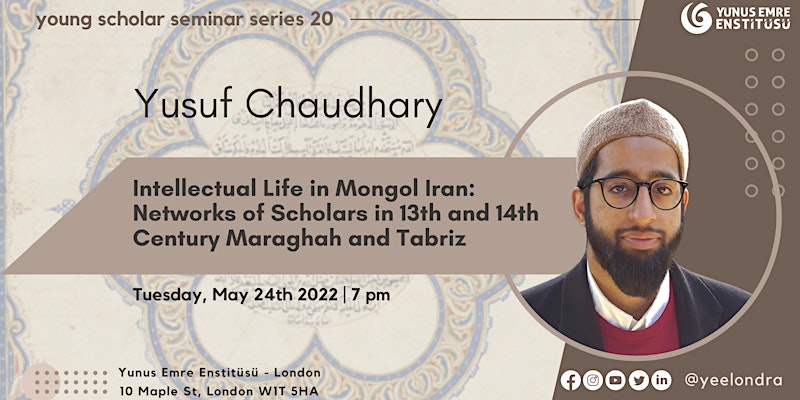Organizing Institution: Yunus Emre Enstitüsü - London
Contact email: [email protected]
Start Date: May 24, 2022 (19:00)
End Date: May 24, 2022 (20:30 BST)
Cost: Free
Website: https://www.eventbrite.com/e/intellectual-life-in-mongol-iran-maraghah-and-tabriz-in-the-13th-and-14thc-tickets-328024097907?aff=ebdssbdestsearch&keep_tld=1
Yunus Emre Enstitüsü - London – London – California – United Kingdom
Yunus Emre Institute London is delighted to announce another exciting Young Scholar Seminar Series talk on “Intellectual Life in Mongol Iran: Networks of Scholars in 13th and 14thC Marāghah and Tabrī” on Tuesday 24th May 2022 at 7 pm (UK Time) with University of Cambridge PhD candidate Yusuf Chaudhary.
The evening will end with a Q&A session with the speaker.
Traditional Turkish Refreshments will be served.
“Intellectual Life in Mongol Iran: Networks of Scholars in 13th and 14thC Marāghah and Tabrīz”
The Mongol period of rule over the Eastern Islamic world is increasingly being recognized as one of vibrant cultural and intellectual exchange, overturning popular narratives of intellectual decline and stagnation. As scholars gathered in the emerging intellectual centers of Marāghah and Tabrīz, a new stage in the history of Islamic philosophy began, which saw a synthesis of Avicennan philosophy, Ashʿarite kalām, and the Sufi metaphysics of the “Greatest Master” Ibn ʿArabī (d. 1240) in Mongol Iran and Anatolia. Becoming home to prolific scholars such as Naṣīr al-Dīn al-Ṭūsī (d. 1274), Quṭb al-Dīn al-Shīrāzī (d. 1311), al-Qāḍī al-Bayḍāwī (d. 1306), al-ʿAllāmah al-Ḥillī (d. 1325), and many others, these intellectual centers in the Mongol Ilkhanate attracted prominent Sunnī and Shīʿī scholars to study and debate philosophy and theology, facilitated both directly and indirectly by the Mongol rulers and their Persian administrators. Many of the works produced in this period have, however, received little attention from contemporary historians or remain unedited in manuscript archives.
In this talk, Yusuf Chaudhary will explore the networks of intellectuals and their works in the two cities of Marāghah and Tabrīz, primarily through the understudied Arabic biographical dictionary of the Mongol-era historian Ibn al-Fuwaṭī (d. 1323). The dictionary provides a view of the intellectual life of the Mongol Ilkhanate through the eyes of one of the most active members of its scholarly elite, and how these two towns became centers attracting scholars seeking patronage, administrative positions, or to engage with the local scholarly community. Through this talk, the Mongol Empire will be situated in the broader context of Islamic intellectual history, allowing a better understanding of the process of Islamisation, Islamic theological developments, the relationship between Muslim scholars and the Ilkhanid court, and intellectual transmission in the Islamic East.
Yusuf Chaudhary is a Ph.D. candidate in the Faculty of Asian and Middle Eastern Studies at the University of Cambridge. After completing his BA in History from SOAS, University of London, he completed his MPhil in Classical Islamic History at the University of Cambridge examining the theological works of the Ilkhanid prime minister Rashīd al-Dīn al-Hamadhānī (d. 1318). His main research interest is in Islamic intellectual history during the late medieval period, the Mongol interaction with the Islamic world, and the Islamisation of the Mongols.



